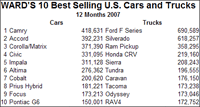
For years it was a given – the Detroit-based Big Three were the top three sellers in the United States and Ford was usually number two. With the release of the 2007 sales statistics, that paradigm was cracked wide open – Toyota, shock horror, was Number Two, displacing Ford to a lowly third and kicking Chrysler right out of the ‘big three’, possibly forever.

Discover B2B Marketing That Performs
Combine business intelligence and editorial excellence to reach engaged professionals across 36 leading media platforms.
The bald (Ward’s Auto, adjusted for daily selling rate) numbers are these: General Motors, 3,824,551 cars and light trucks, down 3.1% year on year; Toyota, 2,620,826, up 3.1%; Ford, 2,502,015, down 12.1%; Chrysler, 2,076,062, down 3.1%.
Detroit v Asia? 8,402,628 (off 7.3%) compared with 6,738,854 (a 3.3% gain). At least, many of those Asian-brand autos were built in the US.
Inevitably, brave faces were put on, we-meant-to-do-that statements put out.
Ford marketing chief Jim Farley (who, ironically, left Toyota last autumn to join the blue oval) told Automotive News the company’s focus is now on restructuring operations to be profitable at lower demand levels.
The US trade newspaper noted that, for full-year 2007, it seemed like every piece of good news for Ford was countered by something negative.
It cited as examples: F-150 pickup the top-selling vehicle in the US for the 31st straight year but sales down 13.2% year on year; a 21.4% drop in Lincoln sales in December despite new models such as the MKZ sedan and MKX crossover boosting the year’s count to 131,487 from 120,476.
Automotive News also noted that sales of the Explorer, once Ford’s cash cow and the nation’s best-selling SUV, were down 18% from 2006.
In a statement, Ford said it expected the economic environment to remain challenging in 2008 and saw the first half rate in the range of 15.2 to 15.7m light vehicles.
“We are restructuring our business to be profitable at lower demand and changed mix and accelerating the development of new products people want to buy,” Farley said in the statement.
“We have more work to do to reach our ultimate goal – profitable growth for all. But we have made progress in a short amount of time in several key areas.”
Total light vehicle sales fell 2.5% to 16,089,312 in a year in which the sub-prime mortgage crisis credit crunch and rising petrol prices added to the woes of a US-based industry already desperately trying to restructure and downsize to reduce unit costs and offset crippling healthcare ‘legacy’ costs not borne by newer Asian rivals.
Things didn’t go all Toyota’s way, however.
“Two of our key markets, Florida and California, were hit hardest by the housing fallout,” Toyota Division general manager Bob Carter told Automotive News. “We still see the fundamentals as very strong. We see that carrying into 2008, especially the second half.”
And, though its Lexus Division was best-selling luxury vehicle brand, with sales of 329,177 units, for the eighth year in a row, Toyota failed to meet its sales target of 200,000 for the new Tundra pickup – despite heavy incentives last summer and autumn, Tundra sales for the year totalled 196,555, the paper said.
Ford and Toyota need not feel alone with disappointing pickup truck sales.
Noted the New York Times: “…2007 was the year the pickup hit the wall [and] that’s bad news for auto companies, which have long relied on pickups as a steady supplier of hefty profits as they responded to consumers’ shifting tastes for other vehicles.”
The paper noted that trucks survived the recent SUV sales downturn because businesses still needed workhorses and some drivers still wanted to stroke their egos by owning “the biggest wheels on the block”, but analysts now say that high petrol prices, the housing slump and the uncertain economy are causing would-be buyers to hold off visiting dealers.
“Pickup truck sales are victims of the economic conditions we’re now in,” Autodata president Ron Pinelli told the New York Times.
Sales of GM’s F-series-rivalling Silverado fell 2.8% in 2007 and the automaker is cutting truck production this winter as it eliminates several thousand union jobs, the paper noted.
Citing Autodata, the paper added that collapsing pickup sales were a primary reason that Detroit plummeted to its lowest market share ever last year, taking just 51% of American sales.
Ford (F-series) and Chrysler (Dodge Ram) have major truck redesigns ready for this month’s Detroit motor show while Toyota has a smaller concept under covers.
Sales of Honda’s Ridgeline truck fell 15% in 2007, even though the automaker posted its 11th straight year of higher sales in the US, and Nissan’s Titan fell 9.2% from 2006, the New York Times said.
“This was definitely a challenging year to be in the car business, and 2008 isn’t likely to be a piece of cake,” said American Honda executive vice president Dick Colliver.
An interesting note here: Fit sales in the model’s swansong full year increased 101.4% to 56,432, suggesting the little car – sold elsewhere as the Jazz – found new US friends as petrol prices soared. In contrast, though Civic Hybrid sales set an annual record for the sixth consecutive year, they rose just 3.9% to 32,575.
European manufacturers boosted US sales 2.9% to 947,830. BMW, facing its own profitability challenges this year, led that pack with a 7.1% rise to 335,840.
Among other Asian automakers, Mazda posted a 10.2% rise to 296,113 and Mitsubishi, spurred by a new Lancer and solid Outlander growth was up 8.8% to 128,993 units.
“Talk of weak consumer confidence, credit concerns and rising fuel prices drove consumers toward smaller, more efficient vehicles and to crossover SUVs,” said Mazda chief Jim O’Sullivan. Nevertheless, 2007 was a difficult year and we fully expect the industry will face even tougher conditions in 2008.”
Graeme Roberts









